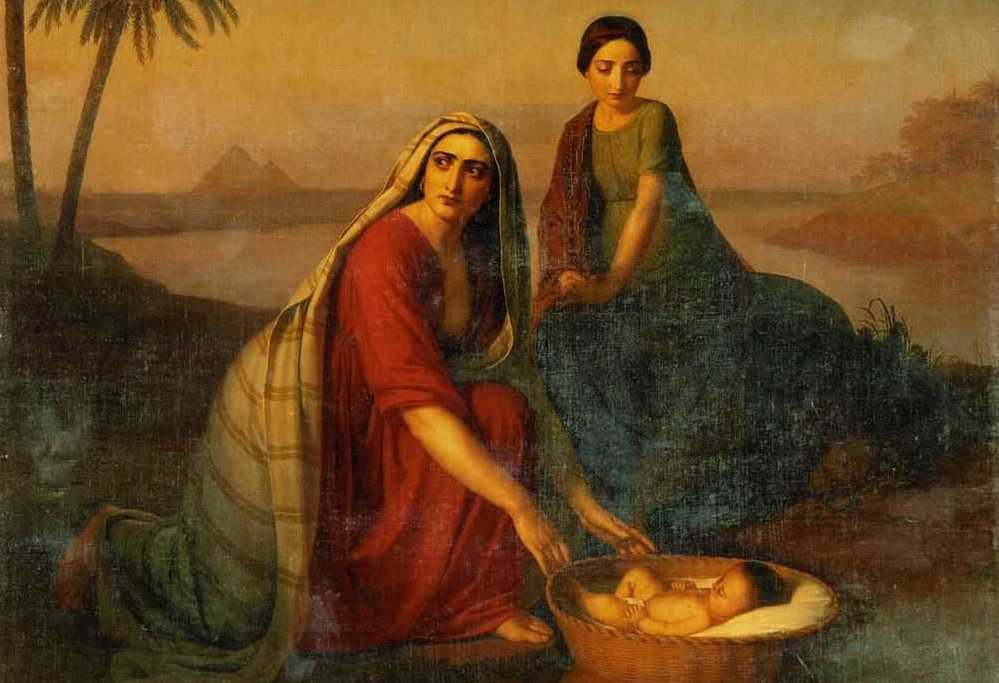The story of the baby Moses placed in a basket and abandoned to the River Nile has attracted the attention of scholars, especially folklorists, because it appears to conform to a widespread motif that is characteristic of tales about the birth of heroes.
A well-known example is the nativity of Oedipus in Greek mythology. Laius, his father, had received an unfavorable oracle from Apollo; therefore, when a son was born to him, he handed him over to a shepherd to be exposed on Mount Cithaeron. Disregarding instructions, the shepherd entrusted Oedipus to another shepherd, who, in turn, gave him to Polybus, King of Corinth. The monarch and his wife reared Oedipus as though he were their own son.
Another example of the same genre is the story of the birth of Heracles (Hercules). He was abandoned by his mother Alcmene but was found by Athena, who handed him over to Hera. She, unaware of the baby’s parentage, gave him to his own mother.
A third instance from classical literature is the famous talc of Romulus and Remus, the mythical founders of the city of Rome. The twins were born to Rhea Sylvia, a princess and Vestal Virgin, who had been violated by Mars. Amulius, younger brother of her father Numitor, deposed the king and ordered the infants to be thrown into the River Tiber. However, the chest in which they were placed washed ashore; the twins were found and suckled by a she-wolf until their discovery by Faustulus, the royal herdsman. He and his wife brought up Romulus and Remus as their own sons.

Help us keep Jewish knowledge accessible to millions of people around the world.
Your donation to My Jewish Learning fuels endless journeys of Jewish discovery. With your help, My Jewish Learning can continue to provide nonstop opportunities for learning, connection and growth.
Two Near Eastern Abandoned Heroes
The identical motif occurs in the biographies of two Near Eastern heroes.One concerns the birth legend of Sargon of Akkad, the great empire builder of Mesopotamia. Purporting to be autobiographical, the cuneiform text claims that he was the love child of a high priestess of noble descent, the father being unknown. Disclosure of his mother’s indiscretion would have entailed the loss of her office, for which childlessness was an indispensable precondition.
Accordingly, Sargon’s mother placed him in a basket of reeds, which she caulked with bitumen, and abandoned him to the River Euphrates. Carried downstream, the infant was discovered and saved by Akki the water drawer, who adopted him. Later in life, Sargon was favored by the goddess Ishtar and seized the throne of Akkad, which he held for 55 years.
The other Near Eastern example of this popular theme pertains to Cyrus, son of Cambyses, founder of the Achaemenid Persian Empire. His grandfather Astyages, king of the Medes, experienced two dreams that were interpreted to mean that his newly born grandson Cyrus would one day usurp his throne. He therefore ordered his trusted servant Harpagus to murder the infant.
Forbearing to commit the deed himself, the man summoned a herdsman named Mithradates, handed him the baby, and commanded him to leave him to die on a mountain range. The herdsman, however, took the infant home, only to discover that his wife had just given birth to a stillborn baby. The couple substituted Cyrus for the dead infant, whose body they left on the hills instead. Ten years later, by a quirk of fate, Cyrus’s true identity was uncovered.
How the Story of Moses Differs
A close examination of the account of the birth of Moses clearly demonstrates striking differences that distinguish it from the foregoing examples. Other than the life-threatening exposure of the infant, all the significant details of the ’s narrative are antithetical to the conventional characteristics of the literary genre that has to do with the birth legends of heroes.
First of all, a singular feature in the biography of Moses is the absence of a divine announcement foretelling his birth. There are no prophecies about his destiny or fate, no omens of future greatness, and no supernatural phenomena appear in connection with the event. The absence of these items conspicuously distinguishes the biblical narrative from the popular biographies of heroes.
There are many other considerations as well. The baby Moses is neither the issue of an illicit relationship nor the child of nobility or royalty. There is no parental or grandfatherly hostility to the newly born. The mother desperately makes every effort to retain her offspring at home as long as possible, and she cedes him to the river only to circumvent the pharaoh’s decree of genocide.
Even then, she does not assign the task to someone else but carefully and tenderly puts the baby in a well-caulked basket that she places among the clumps of reeds by the riverbank, so that it would not float away and would be spotted by the princess. She also takes measures to make sure that she keeps track of developments. Again, the finder in the Exodus story is not the usual person of humble birth but the daughter of royalty, who at once recognizes the Hebrew identity of the infant.
Reprinted from The JPS Torah Commentary: Exodus, with the permission of the Jewish Publication Society.



